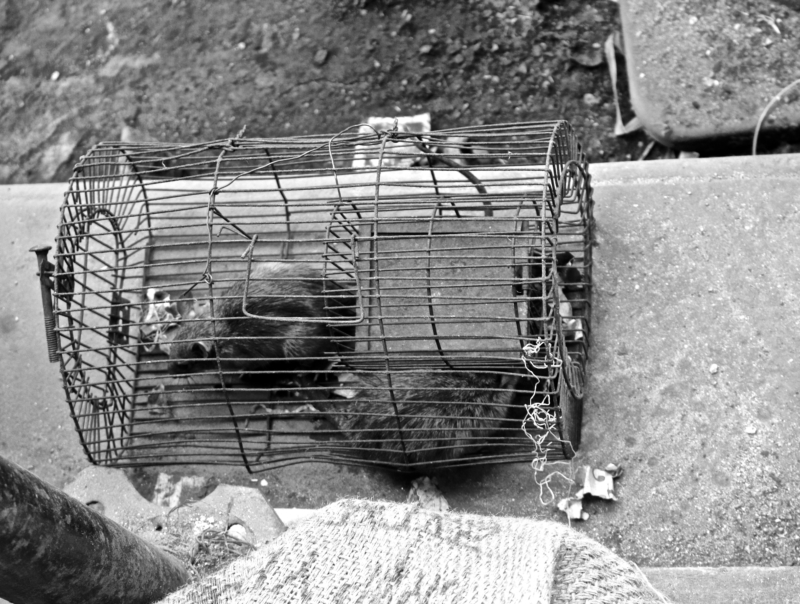By Koushik Banerjea
“What are you doing?”
He was surprised by the question, believing himself to have been alone. He had been admiring himself in a shard of mirror he had found earlier, discarded on the dirt road snaking around the park. Gauging his reflection, he tried to look haughty, then severe, by turns flaring his nostrils then dulling his eyes. Was it obvious he was a thief? He didn’t think so, not any more.
“You! I asked you a question. Are you deaf?”
He turned around hoping the disdain didn’t show. His questioner stood, feet apart, in the familiar khaki uniform of the police. The man was carrying a bhuri, a little Ganesh potbelly, sagging over his belt, and in that one detail could be spied so much of what would always divide them. As much as the uniform or the steel tipped lathi, it was the softness of that belly, its partiality to sweetmeats and greed, which marked out this man’s tribe.
“No, sir. I was just leaving, sir,” he said to the policeman, observing the expected protocol but knowing from the deep-set rituals of the cage that it meant nothing.
He watched as the policeman prodded a bundle of rags a little further along the path. The rags began to stir and a dishevelled face appeared, already terrorized long before the steel tip brushed its chin. He realized then his good fortune in even being afforded the courtesy of a question. Standing there with a shard of glass in one hand, he could just as easily have been deemed a threat by the policeman. The city was on edge, the bodies still fresh, and he was taking a risk each time he drifted away from the huddle. He knew he had to hurry back to his brothers, still prone on the same benches where they’d eventually found one another, to warn them of the danger. But when he did, he saw to his relief that they were already awake, sitting up for the policeman’s benefit like a couple of early morning bhadralok, discussing current affairs. The lathi briefly paused, satisfying itself that these were indeed gentlemen and not miscreants, before moving on to the next set of unfortunates.
And watching this, with the shard now safely wrapped in a fold of his vest, it made him think how no one ever asked the right questions. It had been just the same when he was in the cage.
•
Picking away at the scab, he felt a certain amount of regret. Space was limited here and he had taken to marking his tiny locale with whatever was at hand. More often than not this involved hair (his own), or a chipped fingernail, and on one occasion a tooth unhooked by day after day of the cage gruel. But today he had noticed a scab building up on his forearm, and the urge to scratch the itch had proven too great to resist. The skin had not yet flaked, so his action drew blood and pus. He didn’t mind too much, though, as it made for a richer signature on the floor. He knew the other inmates would be looking at him as he pinched the skin, then released the gunk; knew as well that there would be no complaints, the memory still fresh of those other days when it was their teeth or blood that had lined the floor.
He sensed that his blood had been in some way corrupted by the surroundings. Now even the mosquitoes tended to avoid him on their night-time sorties. The moan and slap of the other wretches meant they were still being plagued by malarial torments, yet his nights were oddly peaceful. He would hold the gruel down and continue to build himself up with press-ups on his knuckles. And he would watch, and wait. The wretches would occasionally come to blows with one another, but even when this happened they were careful not to allow their dispute to spill over into the micro-fiefdom he had marked out for himself. His vest started to fill out with this taut system rigour, vein and fibre and barely concealed violence in those arms; the knuckles long since cured of the taste of floor, safeguarded as they were by an extra layering of skin. And though he was young, one of the youngest in fact in the cage, there was now a strong beard shielding that face.
And then one day the news he had been so desperate to hear. News he had waited so long for that there were times when his resolve had nearly crumbled, when he had imagined that this was what his life would always be. Yet when it finally came it was delivered without ceremony. A perfunctory ‘You!’ and the unlocking of bolts. Space, which he now knew to be the most precious of companions, was apparently needed for another kind of inmate, and with a final reminder that he was a lucky badmaash ringing in his ears, the system spat the thief back out into the dust and the tumult.
•
No one was there to meet him, and after the initial disappointment, which was barely even that, he felt nothing. Shielding his eyes from the harsh glare of late morning, he squinted at the first building that lay beyond the dirt track and at the thick plume of smoke that was rising from it.
•
“Bhaiyya,” implored a man, skeletal arms thrust outwards, that simple action evidently so draining that no more words would come.
He paused to look at the man, noting the distant saucers of eyes set back in hollow sockets. Instinctively he reached up to soothe the bridge of his own nose with thumb and forefinger; felt surprised when the fingers traced thick hair in the space just below his cheekbones; strode on purposefully towards the plume without looking back.
•
As he crossed the waste ground, his eyes picked out more stricken figures, little more than shapes really, only the occasional spasm indicating any life at all. Mostly, they were just covered in rags, though one or two were still sitting, as though meditating, in the clothes they must have been wearing when their lives were touched by fire or tragedy or whatever it was that had left them like this.
He could hardly bring himself to look at these figures, so implacable did they appear in their sadness. It was even worse with the ones who called out to him, begging for food, or, perhaps, just comfort.
“Dada. Bhaiyya. Amar ke kichu ekta ditte parben?”
“Dada. Amar khidda.”
Or sometimes, just “Dada.” Dada, though he was barely old enough to be considered anyone’s Dada. He looked at their arms, little more than flesh starved twigs really, and felt something surging up within him. At this stage, there was still no sign of his own brothers, whose Dada he actually was by virtue of being the eldest. Even so, he found himself studying the blank faces on display for any traces of recognition. Perhaps his brothers no longer looked the same? He had heard how beards were grown or heads sometimes shaved. He knew people had done what they could, had often had no choice but to hide in plain sight. There had been whispers in the cage, the most recent arrivals breathing terrible tales of riot and flame, cleaver and bone. And he had absorbed it all, shapeshifting imperceptibly from a thief to a warrior.
People change, he thought, even in a short space of time. He had seen that for himself in the cage. Right in front of him, big, strong men reduced to urchins, the fight drawn out of their faces with one savage beating. The unexpectedness of it, perhaps the shame, but either way all that swagger absorbed by the blows, repainted as something smaller, delivered in silence. Yet these figures around him now were of complete strangers, and in that sense should have exerted no more pull on his imagination than the boundary markers of detritus in the cage. So when he looked again, this time more closely, and saw that they were in fact not meditating but sitting on recently bandaged stumps, he was as surprised as anyone that the thing surging through him, up through his gut and into his throat, then out of his head, felt more primal than anything he had experienced behind bars.
Author’s Note
“Cagey” is a dark little tale of trial and tribe, set in the turbulent period leading up to the Partition of India, in 1947. The timing feels apt this year, which marks the 70th anniversary of those traumatic events, but also the inauguration of deep disquiet at political upheavals on both sides of the Atlantic. Given that we appear to be stuck in the early stages of “post-truth,” the most honest thing I can say about myself and my writing is lifted from the great Chinua Achebe: “I wouldn’t have wanted anyone to teach me how to write. I prefer to stumble on it … not to be told.” I hope some tiny element of that is present in my words. And yes, every fightback begins in the tales we tell ourselves and one another.
Koushik Banerjea is a London-based writer. His work is featured in Verbal magazine and darkmatter: in the ruins of imperial culture.
Photo credit: Caged Rats, Rajasthan by K-B Gressitt ©2016.


Share your thoughts about this.